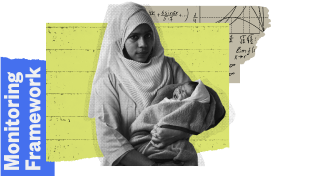
 14,254,400
Total Population
14,254,400
Total Population
A dispute exists between the Governments of Argentina and the United Kingdom of Great Britain and Northern Ireland concerning sovereignty over the Falkland Islands (Malvinas).
The boundaries and names shown and the designations used on this map do not imply official endorsement or acceptance by the United Nations.
Rwanda’s Population dynamics Data


Total Fertility Rate (births per woman)
Adolescent (15-19 years) Birth Rate (births per 1,000 girls)
Maternal Mortality Ratio (Per 100,000 live births)
Rwanda’s national commitment
At the Nairobi Summit, the Republic of Rwanda committed to reducing unmet need for family planning by improving the delivery, access and uptake of family planning services, increasing the number of health facilities and skilled healthcare providers, and by expanding the type of contraceptives available. Rwanda also has committed to reducing preventable maternal deaths by investing in human resources for health, infrastructure, and equipment, and ensuring the availability of commodities and supplies for integrated reproductive maternal, newborn, child and adolescent health services for all people.
In Rwanda, unmet need for family planning is relatively the same in rural and urban areas of the country.
Unmet need is highest among women with no education, and decreases with higher levels of education and household income.
Rwanda’s maternal mortality ratio has been steadily declining since 2000 to 2020, the most recent year for which data is available when it was estimated to be 258.9 deaths per 100,000 live births.
This is nearly five times lower than that of the country in the region with the highest maternal mortality, but still nearly four times higher than the SDG target of 70 deaths per 100,000 live births.
With approximately 94.2% of deliveries in Rwanda assisted by a skilled attendant among married women 15-49 years who had a live birth in the last two years, Rwanda’s rate is one of the highest in the region.
The proportion of births attended by a skilled attendant is slightly higher in urban areas, and increases with higher level of education and household wealth.
Rwanda’s national commitment
Rwanda has committed to promoting youth-friendly policies and increasing demand for adolescent sexual and reproductive health services through awareness raising, community engagement, education, and by expanding the number of health facilities offering youth-friendly services. The country has been promoting strategies and approaches that ensure the involvement of adolescents and youth and ensuring young people can access age-appropriate quality information, comprehensive knowledge and education. Rwanda has also committed to reducing gender-based violence and harmful practices.
In Rwanda, 5.8% of women aged 20-24 years were married before age 18, with 0.3% married before age 15, which is one of the lowest rates in the region.
Rwanda’s adolescent birth rate has decreased from 59.3 in 1990 to 49.4 in 2020, it is among the lower rates in the region.
Births among Rwandan women 20-24 years before age 15 and before age 18 are also among the lowest in the region.
Of the 10.8% of births occurring among women with no education, 6.8% occur between the ages of 15-18 and 4% occur to women younger than age 15. The percentage of births before age 18 decreases with level of education and as household wealth increases.
SDG Goal 16 seeks to promote peaceful and inclusive societies for sustainable development, to provide access to justice for all and build effective, accountable and inclusive institutions at all levels.
One component of this is ensuring responsive, inclusive, participatory and representative decision-making at all levels. The ratio of the proportion of female Members of Parliament in Rwanda is the highest in the region, so is the ratio of the proportion of young Members of Parliament (SDG 16.17.1).
Rwanda has registered key achievements in realizing its’ Nairobi Commitments.
Since the Nairobi Summit, a national action plan to implement Rwanda’s commitments has been developed and endorsed by the Government and various stakeholders. The action plan prioritizes achieving zero unmet need for family planning, zero preventable maternal deaths, and zero gender-based violence and harmful practices to women and girls by 2030.
Review and monitoring of the progress in implementing the ICPD25 commitments has been integrated into the country’s coordination mechanisms. Stakeholders have taken steps to strengthen partnerships and fulfill the commitments. Strategies have been employed to raise awareness and advocate for achieving the Nairobi commitments through social and other media, such as an ICPD booklet and a video.












































